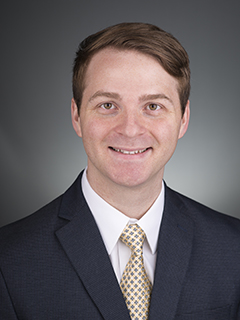2017 New Century Scholars Doctoral Scholarship, 2019 New Investigators Research Grant
Making Words Matter More
 When Shae Morgan was growing up, he failed his hearing screening in school. His parents promptly brought him to a hearing health provider, who gave him hearing aids that, in turn, promptly “went into a drawer”. Now, as an adult and an audiologist looking back on this moment, Morgan-who does, indeed, have mild high-frequency hearing loss-chalks it up to being pressured into receiving treatment that offered no functional benefit at the time.
When Shae Morgan was growing up, he failed his hearing screening in school. His parents promptly brought him to a hearing health provider, who gave him hearing aids that, in turn, promptly “went into a drawer”. Now, as an adult and an audiologist looking back on this moment, Morgan-who does, indeed, have mild high-frequency hearing loss-chalks it up to being pressured into receiving treatment that offered no functional benefit at the time.
“The provider told me that if I didn’t start wearing hearing aids right away, I would start to lose my speech recognition skills,” he recalls. “And now I have all my audiograms from when I was younger and, honestly, I wouldn’t have fit me with hearing aids. I still try them every couple of years, and don’t notice a functional difference yet. Although now I’m excited to wear them when the time comes, they were definitely not a good fit for 17-year-old self-conscious me.”
Still, because of that background, the idea of speech and hearing carried an interest as Morgan followed his academic pursuits. Based on his personal experiences, his research interests started with two separate, yet related questions: First: Do people with hearing loss speak differently because they hear differently? And, if so, does that affect how others view them socially? Second: Do interventions for individuals with large amounts of hearing loss (e.g., cochlear implants) affect the social information an individual can hear in speech (e.g., sarcasm, emotional state, interest, confidence, etc.)? Thus, his interest in auditory processing as it relates to suprasegmental speech – how words are said (suprasegmental) versus what the words are (segmental) – was born.
“The way you talk influences the way people interact with and label you, whether it’s right or wrong,” Morgan explains. “We all make these assumptions and judgments about people every day when we hear them talk. Now, if you could turn that around and control it, you could have the power to influence people’s perceptions by intentionally choosing the way you talk, which to me is mind-blowing. And there’s much less research on this than there is on segmental speech perception like word recognition.”
And that is where Morgan hopes to fill in the gaps. Morgan, who has both his AuD and PhD degrees, wants to understand how social information is spoken and understood in speech. Eventually, he hopes his work will help individuals with cochlear implants to more accurately identify emotions in speech and other suprasegmental parts of speech, compared to hearing the reduced amount of social information currently offered by the devices. He also hopes his findings will further underscore the need for greater advancement and innovation for hearing technology. Additionally, with his research into social perceptions originating from speech patterns, he wants to shine an awareness on how powerful speech can be in creating and perpetuating stereotypes, good and bad. As he explains, “there’s so much more to how we talk than the words we choose to say.”
As a 2017 recipient of the New Century Scholars Doctoral Scholarship and then the 2019 New Investigators Research Grant he received for his study, Auditory Processing of Suprasegmental Speech Information, Morgan says receiving these funds helped boost his confidence in his research instincts. In fact, he is currently working on an additional industry grant with a cochlear implant manufacturer and is in the process of applying for additional funding from the National Institutes of Health. All the while he recalls the teenager he was when he received hearing intervention, he now knows he didn’t need. He hopes to champion change and innovation to help improve the quality of life and hearing care for people, like himself, with hearing loss.
“We’ve come so far, and I’m excited for what we can do together going forward.”
View More Recipient Spotlights